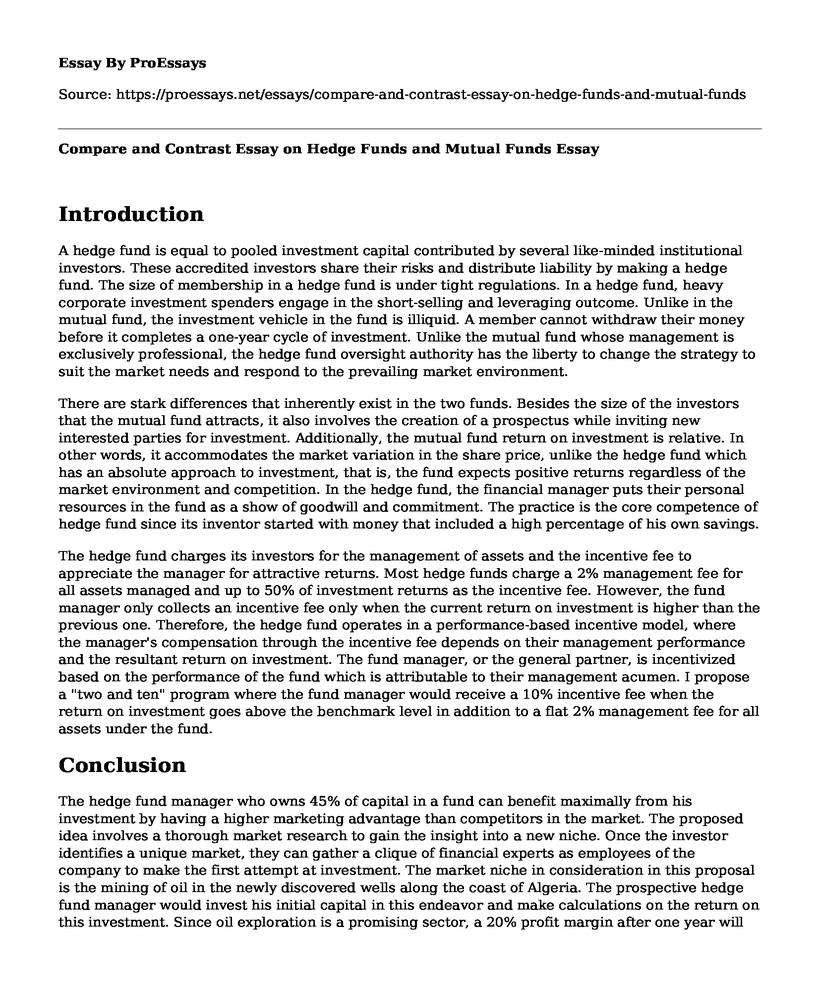Introduction
A hedge fund is equal to pooled investment capital contributed by several like-minded institutional investors. These accredited investors share their risks and distribute liability by making a hedge fund. The size of membership in a hedge fund is under tight regulations. In a hedge fund, heavy corporate investment spenders engage in the short-selling and leveraging outcome. Unlike in the mutual fund, the investment vehicle in the fund is illiquid. A member cannot withdraw their money before it completes a one-year cycle of investment. Unlike the mutual fund whose management is exclusively professional, the hedge fund oversight authority has the liberty to change the strategy to suit the market needs and respond to the prevailing market environment.
There are stark differences that inherently exist in the two funds. Besides the size of the investors that the mutual fund attracts, it also involves the creation of a prospectus while inviting new interested parties for investment. Additionally, the mutual fund return on investment is relative. In other words, it accommodates the market variation in the share price, unlike the hedge fund which has an absolute approach to investment, that is, the fund expects positive returns regardless of the market environment and competition. In the hedge fund, the financial manager puts their personal resources in the fund as a show of goodwill and commitment. The practice is the core competence of hedge fund since its inventor started with money that included a high percentage of his own savings.
The hedge fund charges its investors for the management of assets and the incentive fee to appreciate the manager for attractive returns. Most hedge funds charge a 2% management fee for all assets managed and up to 50% of investment returns as the incentive fee. However, the fund manager only collects an incentive fee only when the current return on investment is higher than the previous one. Therefore, the hedge fund operates in a performance-based incentive model, where the manager's compensation through the incentive fee depends on their management performance and the resultant return on investment. The fund manager, or the general partner, is incentivized based on the performance of the fund which is attributable to their management acumen. I propose a "two and ten" program where the fund manager would receive a 10% incentive fee when the return on investment goes above the benchmark level in addition to a flat 2% management fee for all assets under the fund.
Conclusion
The hedge fund manager who owns 45% of capital in a fund can benefit maximally from his investment by having a higher marketing advantage than competitors in the market. The proposed idea involves a thorough market research to gain the insight into a new niche. Once the investor identifies a unique market, they can gather a clique of financial experts as employees of the company to make the first attempt at investment. The market niche in consideration in this proposal is the mining of oil in the newly discovered wells along the coast of Algeria. The prospective hedge fund manager would invest his initial capital in this endeavor and make calculations on the return on this investment. Since oil exploration is a promising sector, a 20% profit margin after one year will attract any bank or insurance company to put its money in the hedge fund.
Cite this page
Compare and Contrast Essay on Hedge Funds and Mutual Funds. (2022, May 30). Retrieved from https://proessays.net/essays/compare-and-contrast-essay-on-hedge-funds-and-mutual-funds
If you are the original author of this essay and no longer wish to have it published on the ProEssays website, please click below to request its removal:
- Research Paper on Local Funding for Public Schools
- Advantages and Disadvantages of Making Policies that Fund Scientific Research
- Budget Officer Requirements Paper Example
- Online Banking Security: The Current State of Technology With Online Banking Essay
- Paper Example on Windsor Family Financial Plan: Alastair & Wendy's Secure Future
- Essay Example on Financial Statements: Assets, Liabilities, & Mitigating Errors
- Essay Example on Comparing Returns of Private Equity and Investment Firms







